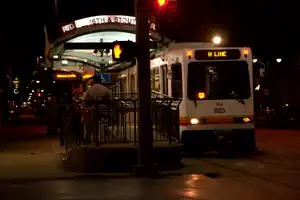H Line (RTD)
The H Line, part of the light rail system operated by the Regional Transportation District in the Denver-Aurora Metropolitan Area in Colorado, was added to the system on November 17, 2006, with the completion of the Southeast Corridor project (the "T-Rex Project"). It is one of four routes that are part of the RTD's service plan for the corridor.
| H Line | ||||||||||||||||||||||||||||||||||||||||||||||||||||||||||||||||||||||||||||||||||||||||||||||||||||||||||||||||||||||||||||||||||||||||||||||||||||||||||||||||||||||||||||||||||||||||||||||||||||||||||||||||||||||||
|---|---|---|---|---|---|---|---|---|---|---|---|---|---|---|---|---|---|---|---|---|---|---|---|---|---|---|---|---|---|---|---|---|---|---|---|---|---|---|---|---|---|---|---|---|---|---|---|---|---|---|---|---|---|---|---|---|---|---|---|---|---|---|---|---|---|---|---|---|---|---|---|---|---|---|---|---|---|---|---|---|---|---|---|---|---|---|---|---|---|---|---|---|---|---|---|---|---|---|---|---|---|---|---|---|---|---|---|---|---|---|---|---|---|---|---|---|---|---|---|---|---|---|---|---|---|---|---|---|---|---|---|---|---|---|---|---|---|---|---|---|---|---|---|---|---|---|---|---|---|---|---|---|---|---|---|---|---|---|---|---|---|---|---|---|---|---|---|---|---|---|---|---|---|---|---|---|---|---|---|---|---|---|---|---|---|---|---|---|---|---|---|---|---|---|---|---|---|---|---|---|---|---|---|---|---|---|---|---|---|---|---|---|---|---|---|---|
| H | ||||||||||||||||||||||||||||||||||||||||||||||||||||||||||||||||||||||||||||||||||||||||||||||||||||||||||||||||||||||||||||||||||||||||||||||||||||||||||||||||||||||||||||||||||||||||||||||||||||||||||||||||||||||||
 H Line train at 16th & Stout station | ||||||||||||||||||||||||||||||||||||||||||||||||||||||||||||||||||||||||||||||||||||||||||||||||||||||||||||||||||||||||||||||||||||||||||||||||||||||||||||||||||||||||||||||||||||||||||||||||||||||||||||||||||||||||
| Overview | ||||||||||||||||||||||||||||||||||||||||||||||||||||||||||||||||||||||||||||||||||||||||||||||||||||||||||||||||||||||||||||||||||||||||||||||||||||||||||||||||||||||||||||||||||||||||||||||||||||||||||||||||||||||||
| Owner | Regional Transportation District | |||||||||||||||||||||||||||||||||||||||||||||||||||||||||||||||||||||||||||||||||||||||||||||||||||||||||||||||||||||||||||||||||||||||||||||||||||||||||||||||||||||||||||||||||||||||||||||||||||||||||||||||||||||||
| Locale | Denver metropolitan area | |||||||||||||||||||||||||||||||||||||||||||||||||||||||||||||||||||||||||||||||||||||||||||||||||||||||||||||||||||||||||||||||||||||||||||||||||||||||||||||||||||||||||||||||||||||||||||||||||||||||||||||||||||||||
| Termini | ||||||||||||||||||||||||||||||||||||||||||||||||||||||||||||||||||||||||||||||||||||||||||||||||||||||||||||||||||||||||||||||||||||||||||||||||||||||||||||||||||||||||||||||||||||||||||||||||||||||||||||||||||||||||
| Stations | 16 | |||||||||||||||||||||||||||||||||||||||||||||||||||||||||||||||||||||||||||||||||||||||||||||||||||||||||||||||||||||||||||||||||||||||||||||||||||||||||||||||||||||||||||||||||||||||||||||||||||||||||||||||||||||||
| Service | ||||||||||||||||||||||||||||||||||||||||||||||||||||||||||||||||||||||||||||||||||||||||||||||||||||||||||||||||||||||||||||||||||||||||||||||||||||||||||||||||||||||||||||||||||||||||||||||||||||||||||||||||||||||||
| Type | Light rail | |||||||||||||||||||||||||||||||||||||||||||||||||||||||||||||||||||||||||||||||||||||||||||||||||||||||||||||||||||||||||||||||||||||||||||||||||||||||||||||||||||||||||||||||||||||||||||||||||||||||||||||||||||||||
| System | RTD Rail | |||||||||||||||||||||||||||||||||||||||||||||||||||||||||||||||||||||||||||||||||||||||||||||||||||||||||||||||||||||||||||||||||||||||||||||||||||||||||||||||||||||||||||||||||||||||||||||||||||||||||||||||||||||||
| Operator(s) | Regional Transportation District | |||||||||||||||||||||||||||||||||||||||||||||||||||||||||||||||||||||||||||||||||||||||||||||||||||||||||||||||||||||||||||||||||||||||||||||||||||||||||||||||||||||||||||||||||||||||||||||||||||||||||||||||||||||||
| History | ||||||||||||||||||||||||||||||||||||||||||||||||||||||||||||||||||||||||||||||||||||||||||||||||||||||||||||||||||||||||||||||||||||||||||||||||||||||||||||||||||||||||||||||||||||||||||||||||||||||||||||||||||||||||
| Opened | November 17, 2006 | |||||||||||||||||||||||||||||||||||||||||||||||||||||||||||||||||||||||||||||||||||||||||||||||||||||||||||||||||||||||||||||||||||||||||||||||||||||||||||||||||||||||||||||||||||||||||||||||||||||||||||||||||||||||
| Technical | ||||||||||||||||||||||||||||||||||||||||||||||||||||||||||||||||||||||||||||||||||||||||||||||||||||||||||||||||||||||||||||||||||||||||||||||||||||||||||||||||||||||||||||||||||||||||||||||||||||||||||||||||||||||||
| Track gauge | 4 ft 8+1⁄2 in (1,435 mm) standard gauge | |||||||||||||||||||||||||||||||||||||||||||||||||||||||||||||||||||||||||||||||||||||||||||||||||||||||||||||||||||||||||||||||||||||||||||||||||||||||||||||||||||||||||||||||||||||||||||||||||||||||||||||||||||||||
| Electrification | Overhead line, 750 V DC | |||||||||||||||||||||||||||||||||||||||||||||||||||||||||||||||||||||||||||||||||||||||||||||||||||||||||||||||||||||||||||||||||||||||||||||||||||||||||||||||||||||||||||||||||||||||||||||||||||||||||||||||||||||||
| ||||||||||||||||||||||||||||||||||||||||||||||||||||||||||||||||||||||||||||||||||||||||||||||||||||||||||||||||||||||||||||||||||||||||||||||||||||||||||||||||||||||||||||||||||||||||||||||||||||||||||||||||||||||||
The line was extended to reach Florida station on February 24, 2017 along with the opening of the R line.[1]
According to a map in the RTD's service plan for the corridor, the H Line's color is blue.[2]
From the start of each day, the H Line begins its service southbound at Evans station to Florida Station. At the end of the service, the H Line terminates its service at I-25 & Broadway station.
There are currently extra H Line trains running due to maintenance work on the Southeast Corridor between I-25/Broadway and Lincoln stations, suspending R Line service south of Florida station.
Route
The H Line's northern terminus is at 18th and California in downtown Denver. It shares track with the L Line (RTD) in Downtown Denver (Stout and California Street Stations) and the D Line and F Line (RTD) until it reaches I-25 & Broadway station, then follows the Southeast Corridor to a junction past Southmoor Station, and follows the I-225 branch of the system to Southeast terminus at Florida station in Aurora.[3]
Stations
| Station | Municipality | Opened | Fare zone |
Major connections & notes |
|---|---|---|---|---|
| 18th & California (northbound) 18th & Stout (southbound) |
Denver | October 8, 1994 | A | |
| 16th & California (northbound) 16th & Stout (southbound) |
||||
| 14th & California (northbound) 14th & Stout (southbound) |
October 8, 1994 | Closed November 27, 2004 | ||
| Theatre District–Convention Center | November 28, 2004 | |||
| Colfax at Auraria | October 8, 1994 | |||
| 10th & Osage | ||||
| Alameda | Park and ride: 240 spaces | |||
| I-25 & Broadway | Park and ride: 1,248 spaces | |||
| Louisiana–Pearl | November 17, 2006 | B | ||
| University of Denver | Park and ride: 540 spaces | |||
| Colorado | Park and ride: 363 spaces | |||
| Yale | Park and ride: 129 spaces | |||
| Southmoor | Park and ride: 788 spaces | |||
| Dayton | Aurora | C | Park and ride: 250 spaces | |
| Nine Mile | Park and ride: 1,225 spaces | |||
| Iliff | February 24, 2017 | Park and ride: 600 spaces | ||
| Florida | ||||
FasTracks
The 2004 voter-approved FasTracks initiative extended the H Line approximately 3.5 mi (5.63 km) to the north along Interstate 225 with stops at Iliff Avenue and Florida Avenue. Work began in 2012, and the two station extension was combined with I-225 corridor light-rail line in 2013. Construction was long expected to be completed in 2016,[4] however opening was delayed until February 24, 2017.[5]
References
- "RTD". www.rtd-denver.com. Retrieved 2017-02-12.
- "RTD". www.rtd-denver.com. Retrieved 2017-02-12.
- "RTD – Light Rail System Map". Regional Transportation District. Retrieved June 2, 2014.
- "FasTracks – I-225 Corridor Background". Regional Transportation District. Retrieved January 30, 2014.
- Paul, Jesse (November 18, 2016). "RTD will not open G-Line or R-Line before end of year as planned". The Denver Post. Retrieved November 20, 2016.
